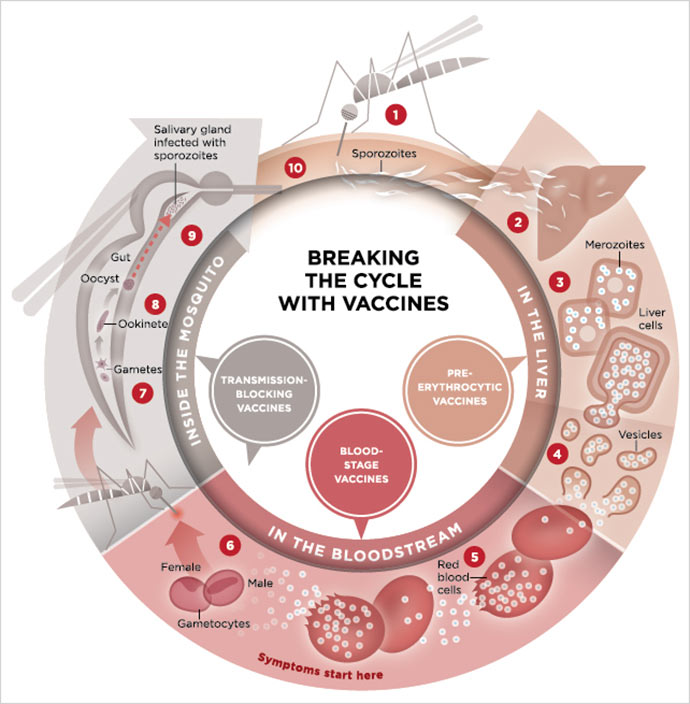Welcome to the May 2015 issue of the Global Washington newsletter.
IN THIS ISSUE
- Letter from our Executive Director
- Question of the Month
- In the News: The Fight to End Malaria
- Featured Organization: Malaria No More
- Changemaker: Ashley Birkett, PhD, Director, PATH Malaria Vaccine Initiative
- Welcome New Members
- GlobalWA Member Events
- Career Center
- GlobalWA Events
Letter from our Executive Director
I’ve often said that Washington state is the hub of global development with an amazing concentration of non-profit and for-profit organizations working to improve lives in developing countries. Recently, this point was underscored with a major non-profit moving their headquarters from New York City to Seattle. Malaria No More decided to place its executive team in Seattle to be part of the thriving community of international actors in our region.
Malaria No More’s move also highlights our region’s role in the fight to eradicate malaria. Global Washington members such as PATH, Pilgrim Africa, World Vision, Med25 International and others have played a significant role in decreasing an estimated 500 million cases of malaria since the year 2000, saving an estimated 4 million lives. PATH’s Malaria Vaccine Initiative is determined to find a game changing solution to break the cycle of the disease. In fact, PATH has made malaria prevention one of the main priority areas of its Reach Campaign launched earlier this month. Multiple and relentless interventions are the only way to combat and roll back this disease.

Medical Teams International provides relief in Nepal
In addition to global health, Washington state is also a leader in emergency response to the two earthquakes and multiple aftershocks in Nepal. Several Global Washington members have mobilized staff and resources in the region. NGOs such as Medical Teams International, Oxfam, Mercy Corps, Med25 International and World Vision are providing immediate response efforts, while other GlobalWA members such as Habitat for Humanity are preparing for critical rebuilding. My heart goes out to those who lost staff and loved ones. Global Washington is partnering with Seattle Foundation to provide aggregated information and updates over the next year of relief and development.
From global health, to emergency response, to economic development, Washington state is exporting critical services and represents the charitable ethos of our region. I encourage you to learn more about these issues and the remarkable work being done by non-profit and for-profit organizations based in our state.
Sincerely,

Kristen Dailey
Executive Director
Question of the Month
![]() GlobalWA will ask you a question every month and synthesize the responses and make available to our member organizations. Please take a moment to respond to the question for this month:
GlobalWA will ask you a question every month and synthesize the responses and make available to our member organizations. Please take a moment to respond to the question for this month:
If your organization is responding to the Nepal earthquakes but isn’t listed here, or if your work in the country has changed over the last several weeks, please give us an update.
In the News
The Fight to End Malaria
By Kaitlin Marshall
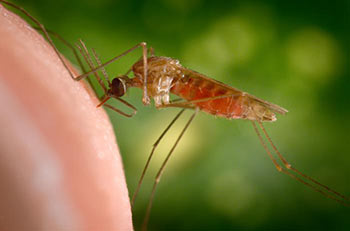
James Gathany/CDC
Malaria is an infectious disease that threatens the lives of people worldwide. Transmitted through mosquitoes, symptoms include fever, headache and vomiting. If drugs are not administered quickly after transmission, malaria infection can develop into anemia, hypoglycemia or cerebral malaria. In cerebral malaria, capillaries carrying blood to the brain are blocked which can lead to learning disabilities, coma and even death.
If left untreated, malaria can develop into the severe form of the disease which means organ failure or abnormalities in blood or metabolism. Symptoms of severe malaria include difficulty breathing and convulsions, and approximately one-fifth of these patients die even if they are hospitalized in a timely fashion.
In 2013, there were an estimated 198 million cases of malaria worldwide. Each year, approximately 600,000 lives are lost to the disease with approximately 90% of all deaths occurring in Sub-Saharan Africa. Children and pregnant women are the most vulnerable, with 78% of all malaria deaths occurring in children under the age of five. In Sub-Saharan Africa, a child dies from malaria every minute.
Malaria is both a result of and a cause of poverty, preventing adults from working, keeping children out of school, and drying up government funds. Families affected by malaria in rural areas, for example, harvest 60% fewer crops. In some countries, the disease accounts for up to 40% of total health expenditure and 20-50% of hospital admissions. The cost of malaria to Africa alone is an estimated $12.5 billion per year, or 1.3% of GDP.
Between 2001 and 2013, an estimated 4.2 million lives were saved as a result of an increase in malaria interventions. Still, malaria has hindered the achievement of several Millennium Development Goals (MDGs) including improving maternal health, reducing infant mortality rates, and achieving universal access to primary education. Pregnant women, for example, are four times more likely to contract and twice as likely to die from malaria as other adults. In Africa, malaria during pregnancy causes 400,000 cases of severe maternal anemia and 200,000 newborn deaths each year. Young children, especially infants, are more vulnerable to all forms of malaria with repeated infections causing children to miss long periods of school. Malaria also makes children more susceptible to diseases such as diarrhea and pneumonia, which can lead to even more time away from school.
Prevention and Treatment
There are a variety of ways to prevent and treat malaria with access to rapid-diagnostic tests expanding in rural areas and artemisinin-based combination therapy drugs (ACTs) being widely used. A full course of ACTs costs just one dollar, and can cure a child in one to three days. While scientists around the world work to accelerate the development of a malaria vaccine, strategies to protect against infection include using mosquito nets to create a protective barrier at night when most transmissions occur, and spraying insecticide in homes to kill mosquitoes. Malaria interventions are available, cost-effective, and have contributed to a 48% global decline in malaria deaths. Continued and sustainable funding, however, is needed. The Bill and Melinda Gates Foundation, a GlobalWA member, has set aggressive goals to provide bed nets to every household that needs them. How impactful are bed nets? In Senegal, where 80% of households own a bed net, the number of malaria cases went down 41% in a single year.
The Funding Gap
An estimated $5.1 billion is needed each year to achieve universal access to malaria interventions by 2020. At present, however, less than half of the money needed is available. This $3.5 billion funding gap threatens to slow down progress in the fight against malaria. This is especially worrisome in Africa, where countries with the highest malaria risks are facing some of the highest funding gaps. Without sustained long-term funding, the gains made against malaria could be reversed.
Raising Awareness
World Malaria Day was established in 2007 as a way to mobilize advocates and citizens around the world to help put a stop to the disease. This year’s April 25th World Malaria Day theme is Invest in the future, Defeat malaria, which encourages people to help close the malaria funding gap. 2015 also marks the ten-year anniversary of the President’s Malaria Initiative (PMI). The goal of the PMI was to reduce malaria-related mortality by 50% across fifteen high-burden countries in Sub-Saharan Africa through a rapid scale-up of treatment and prevention. The PMI’s achievements include the procurement of 40 million insecticide treated mosquito nets and 48 million antimalarial treatments.
Recently, the federal government released the PMI’s strategy for 2015-2020 which is “to work with PMI-supported countries and partners to further reduce malaria deaths and substantially decrease malaria morbidity, towards the long-term goal of elimination.” NGO’s are crucial to helping achieve the PMI’s goals.
GlobalWA Members on the Front Lines
- Malaria No More: Malaria No More is helping to eradicate malaria by engaging leaders, rallying the public, and delivering lifesaving tools and education to families across Africa. Rallying U.S. political leaders to provide funding and to support policies that will help eliminate the disease, Malaria No More also conducts campaigns abroad that encourage citizens to take steps to protect themselves. These campaigns frequently employ local celebrities, and focus on such topics as reminding people to use their mosquito nets.
- MED25 International: Providing individuals in rural African communities with quality, culturally appropriate, and affordable health care, Med25 serves the larger Mbita District of Kenya which is home to over 118,000 residents from farming villages and fishing communities. MED25 runs a comprehensive care clinic that provides services to prevent and treat an array of diseases, including malaria. The clinic brings medicine to people who would otherwise not have access to treatment.
- Medical Teams International (MTI): MTI responds to disasters worldwide and supports long-term global health initiatives. They provide medical supplies to communities that need them most but that lack access to life-saving resources. In 2014, for example, MTI volunteers took mosquito nets to communities in Uganda and showed families how to properly hang them. Widespread use of mosquito nets help slow the spread of malaria by preventing bites from disease carrying mosquitos.
- PATH: PATH is dedicated to creating sustainable solutions that enable communities around the world to break longstanding cycles of poor health. PATH attacks malaria from all sides — treatment, prevention and elimination. To help those suffering from malaria, PATH provides a stable supply of the best malaria drugs available. PATH also supports countries in controlling the parasite with innovative methods such as new approaches to diagnose the disease, as well as provides scientific expertise to drive the development of the world’s first malaria vaccine.
- Pilgrim Africa: Pilgrim Africa is dedicated to creating a malaria-free Uganda. Of every dollar spent on malaria in their budget, about 10 cents goes to education and awareness. They also do district-wide demonstrations of effective malaria control, in partnership with the Ministry of Health, in order to show how malaria transmission can be reduced dramatically, and at scale. And, their Move on Malaria projects save lives, prevent disease, serve as direct and important operational research for national scale-up plans, and will further increase attention, awareness and hope within Uganda that malaria can be defeated.
- PSI: PSI focuses on a variety of interventions to improve the availability, affordability and use of effective malaria treatment. PSI supports Ministries of Health in 38 countries and is the largest distributor of insecticide-treated mosquito nets in the world. Interventions include rapid diagnostic tests and quality medicines to effectively treat the disease. PSI collaborates with national malaria control programs to develop strategies that suit each country’s needs.
- World Vision: With projects in nearly 100 countries, World Vision is dedicated to working with children, families and their communities to reach their full potential by tackling the causes of poverty and injustice. Focusing on child and maternal health, World Vision provides medicines, supplies and interventions to prevent and treat malaria. To date, 3,330,313 people have been protected from malaria by distributions of long-lasting insecticidal nets with the support of World Vision donors.
Featured Organization
Malaria No More
By Kaitlin Marshall
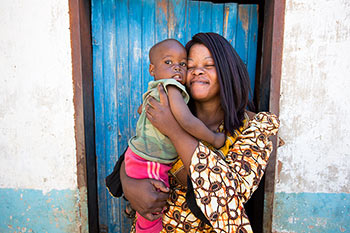
Esther Havens Photography
While malaria was eradicated in the United States in 1951, it remains a menacing threat to 3.3 billion people worldwide. Each year, approximately 584,000 people die from the disease with 78% of all malaria deaths occurring in children under the age of five. That means a child dies from malaria every minute. The parasite keeps more African kids out of school than any other disease and costs Africa an estimated $12 billion per year in lost productivity.
The good news is that statistics prove that investments in malaria prevention pay off. Since 2000, an estimated 670 million cases of malaria have been averted and 4.3 million lives saved due to the work of organizations including Global Washington member Malaria No More (MNM). In the words of CEO Martin Edlund, MNM exists “To help ensure nobody dies from mosquito bites and, ultimately, that we eradicate the disease.” MNM works to accomplish its mission by engaging global leaders, mobilizing existing resources and launching innovative advocacy programs in endemic countries.
Rapid-diagnostic tests, successful drug treatments and cost-effective prevention techniques like mosquito nets have all helped reduce the child malaria mortality rate by 58% in Africa. What allows malaria to wreak such havoc, though, is that not everyone who needs treatment and prevention methods has access to them. As Edlund explains, “You need great analysis of needs on the ground, quantification of needs. You need the entire supply chain and delivery mechanisms to be in place and to be managed very, very well. Then, at the end of the day, you need both the caregiver and the patient to administer the test or treatment appropriately.” MNM is working to mobilize resources and tools to ensure that all of the pieces are in place for everyone to get the lifesaving testing, treatment and prevention they need. To date, MNM has covered more than 5 million people in 17 African countries with mosquito nets that protect people at night, when mosquitoes are most active and most likely to transmit malaria.
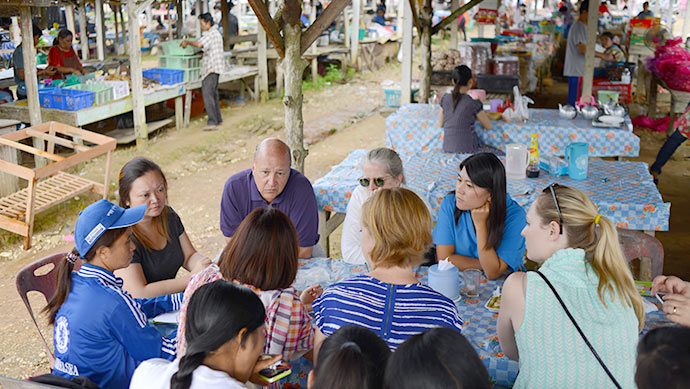 While fewer people die from malaria each year, MNM will not slow down the fight. “The reality of malaria is, if you take your foot off the gas, [malaria] comes roaring back. There have been 75 documented cases of resurgence in the last 85 years. Almost all of them were as a result of success,” explains Edlund. “We saw the malaria burden fall, and then countries shifted money away from malaria control, and malaria came back in a big way.” In short, malaria will continue to pose a threat until the disease is eliminated.
While fewer people die from malaria each year, MNM will not slow down the fight. “The reality of malaria is, if you take your foot off the gas, [malaria] comes roaring back. There have been 75 documented cases of resurgence in the last 85 years. Almost all of them were as a result of success,” explains Edlund. “We saw the malaria burden fall, and then countries shifted money away from malaria control, and malaria came back in a big way.” In short, malaria will continue to pose a threat until the disease is eliminated.
There is an extensive community of organizations in Seattle dedicated to combatting malaria, and MNM wanted to be in proximity to this network. That’s why they recently opened an office in Seattle where their executive team will be housed. “Seattle is the first city in the malaria fight,” says Edlund. “There’s really no other place on the planet where so many innovative elements of this campaign are coexisting in this way. I’m convinced that when the history of this disease is written, Seattle is going to be a big part of it.”
Distributing medical interventions to at-risk populations is just one piece of MNM’s game plan to ultimately eradicate malaria. They are currently well situated to carry out another important aspect of the organization’s mission — advocacy campaigns. “What we are trying to do is show people a way forward, have people recognize that there is an endgame for this disease, and that continued investment is the only way to get us there,” explains Edlund. MNM has helped grow global funding for malaria to more than $3 billion per year.

Esther Havens Photography
Edlund is also a huge proponent of using innovations in data and mobile phones to battle malaria. Cell phones have allowed for better disease surveillance and increased engagement of at-risk populations, particularly in Sub-Saharan Africa where 90% of all malaria deaths occur. In Cameroon, for example, MNM supported the SMS for Life Program. This program allows health workers to send texts with important, lifesaving daily reports about their malaria patients in areas where landlines aren’t available. MNM has also teamed up with local celebrities in places like Senegal to conduct campaigns to remind people to use their mosquito nets to protect themselves at night.
We know the fight to eradicate malaria is complex and demanding. But through the dedication of organizations like MNM, it can be won. “I think there is an opportunity for this generation to do what was once thought impossible — to eradicate malaria from the face of the globe,” says Edlund. “What we do in the next five years is going to determine whether or not we put ourselves on a path towards achieving that goal.” With continued investment and advocacy, it’s possible that one day no child will die from a mosquito bite ever again.
To learn more about malaria and how you can help keep the cause on the world’s agenda, visit malarianomore.org or 1billionnets.org.
Changemaker
Ashley Birkett, PhD, Director, PATH Malaria Vaccine Initiative
By Kaitlin Marshall
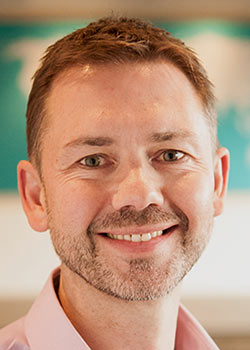 Ashley Birkett, the director of the Malaria Vaccine Initiative (MVI) at Global Washington member PATH, has known since his school days that he wanted to utilize his interest in science to help people. “I’ve always been interested in the application of science,” said Birkett. “At a young age, I recognized the power of vaccines and what they can do for global health.”
Ashley Birkett, the director of the Malaria Vaccine Initiative (MVI) at Global Washington member PATH, has known since his school days that he wanted to utilize his interest in science to help people. “I’ve always been interested in the application of science,” said Birkett. “At a young age, I recognized the power of vaccines and what they can do for global health.”
Birkett completed his undergraduate degree in applied biological sciences in Bristol in the United Kingdom. His undergrad education included a year-long stay in the United States, where he later returned to complete his PhD in biochemistry and molecular biophysics in Virginia. After receiving his PhD, Birkett began working on vaccine development for a company in San Diego. He worked for for-profit companies for over ten years until, seven-and-a-half years ago, he accepted the opportunity to join PATH and MVI.
“The for-profit companies were a great opportunity to learn about product development,” said Birkett. The challenge he felt, however, was that he couldn’t always focus on innovations that would have the biggest health impact. Working on products that are going to drive a stock price or be of interest to investors can be limiting. When he joined PATH, Birkett was ready to apply his skills to a project where he would have the flexibility to aim for generating the highest impact on global health. “At an organization like PATH you can do the right thing, be absolutely data driven, and really focus on what is working; further, we have access via our partners to a very powerful array of tools to apply to achieving our mission. This is critical to our success in overcoming the greatest infectious disease threats that mankind faces.” At PATH, Birkett is sharply focused on finding the best approach to developing malaria vaccines that will protect countless people, living in some of the poorest regions of the world, from the deadly parasitic disease.
In 1999, the Bill and Melinda Gates Foundation awarded an initial $50 million grant to create MVI. At the time, as is the case today, there was very little commercial incentive to create a malaria vaccine and therefore a chronic lack of funding to support product development. The investment from the Gates Foundation provided much needed financial support to accelerate vaccine development efforts. Since then, MVI has terminated dozens of unsuccessful approaches to ensure precious resources are targeted to the few successful ones. While remaining committed to their mission to accelerate the development of malaria vaccines and catalyze timely access in endemic countries, recent years have seen a shift to a focus primarily on developing vaccines to accelerate malaria elimination.
Prior to Birkett being named MVI’s director in October 2013, he led Research and Development for close to six years. As R&D Director, Birkett worked on building a portfolio of projects and generating data to determine which were worth pursuing. “I really knew the business, I knew the funders, I knew the partners and I knew the team,” said Birkett. Becoming the head of MVI, therefore, was a natural transition for him.
Birkett’s responsibilities include overseeing a staff of 40, as well as pursuing and maintaining the initiative’s strategic relationships. “Thanks to the investment strategy of our funders, we have a very flexible approach to achieving a very specific set of goals in malaria vaccine development,” said Birkett. “We bring the full suite of tools and expertise that you need to accelerate the development of a vaccine project. We are sort of the glue that holds things together and drives things forward.”
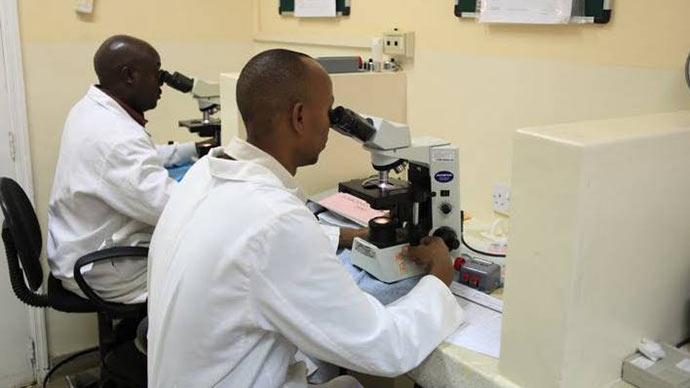
John-Michael Maas/Darby Films
Though much progress has been made in controlling malaria over the past ten years, over 200 million new cases of malaria continue to be diagnosed each year, across 100 countries. “We’ve reduced malaria deaths from over a million per year to half a million per year and even eliminated the parasite from some countries. That’s massive progress.” said Birkett. “But, still, half a million deaths per year, mostly kids under five — it’s just not acceptable.” A malaria vaccine would be a game changer for the global fight to eradicate the parasite that causes the disease. Vaccines have the potential to break the cycle of malaria transmission in which the parasite goes from mosquito to human, and then back to mosquito.
MVI is focused on two primary types of vaccines. One of these two vaccines would protect humans from mosquitoes, and the other would protect mosquitoes from humans. Preventing the disease from transmitting back to mosquitoes will help stop the parasite from spreading through communities so that, ultimately, malaria causing parasites are eliminated from communities. “We have strong biological evidence that we can do it,” said Birkett. “In product development, having that knowledge is really empowering and gives you a great amount of confidence and hope that you’ll be successful.”
When asked about challenges he faces as director of MVI, Birkett responded that he doesn’t get hung up on challenges. “I remind myself how privileged we are to be able to do this type of work and get paid for it. It’s such an honor, really, to apply your skills to a cause like this, as part of an organization like PATH.”
Birkett will continue working to strengthen MVI’s project portfolio, pursuing what works and finding new projects to replace those that don’t to edge closer to the ultimate goal of a highly effective vaccine. “It’s very easy to remain motivated and driven when you see what you’re dealing with — a healthy little kid plays outside, gets bitten by a mosquito, and dies within weeks. That’s not acceptable.”
Welcome New Members
Please welcome our newest Global Washington members. Take a moment to familiarize yourself with their work and consider opportunities for support and collaboration!
Adamant Strategies: Adamant Strategies helps clients succeed abroad by delivering trustworthy information, best tools, and the right people – on short notice, anywhere on the planet. They have built successful enterprises from the ground up in some of the world’s most complicated neighborhoods. www.adamantstrategies.com
Malaria No More: Malaria No More is determined to end deaths from malaria by engaging leaders, rallying the public, developing innovative new approaches and delivering life-saving tools and education to families across Africa. Founded in 2006 by business leaders Ray Chambers and Peter Chernin, Malaria No More is working to create a world in which no one dies from a mosquito bite. www.malarianomore.org
Pilgrim Africa: Pilgrim Africa was founded in 2001 as an indigenous faith-based response to the plight of more than 1.5 million internally displaced people in war-torn Northern Uganda. By providing health services, education, trauma-counseling and agricultural training, Pilgrim Africa has gained a national reputation for catalyzing local solutions into widespread, social change. Its mission is to challenge despair, love boldly, and help African people create a future of sustainable prosperity and health. www.pilgrimafrica.org
Member Events
May 21: Oxfam America // Nepal Fundraiser for Oxfam’s Relief Work
May 28: Shoreline Community College // Brazil’s Metamorphosis
May 30: Women’s Enterprises International // Walk for Water 2015
June 11-12: Trade Development Alliance // Complying with U.S. Export Controls
June 13: Medical Teams International // Field of Dreams Dinner & Auction
Career Center
Highlighted Positions
Operations Manager – Global Visionaries
Business Development and Fundraising Lead – Mona Foundation
ONW Coordinator – Oikocredit Northwest
Director of Development – PeaceTrees Vietnam
For more jobs and resources, visit https://globalwa.org/resources/careers-in-development/
GlobalWA Events
May 20: New Member Orientation
May 21: Networking Happy Hour with Friends of GlobalWA, Humanosphere and World Affairs Council
May 22: Executive Director Roundtable
June 9: Impactful Innovation – A Panel Discussion
December 10: GlobalWA 7th Annual Conference
